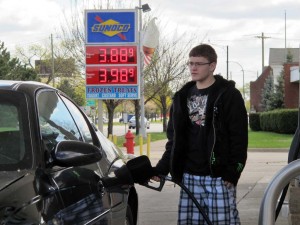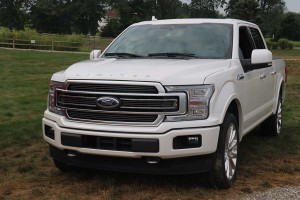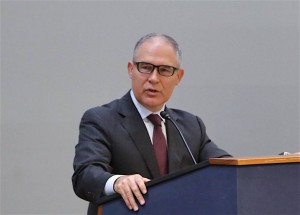
The EPA's mileage rollback is coming just as gas prices start to surge. Critics warn automakers of a backlash if the numbers reach previous highs.
The EPA and NHTSA are expected to propose cutting the current federal fuel economy mandate by nearly 25% while also revoking the State of California’s ability to set its own tougher standards.
Embattled EPA Administrator Scott Pruitt has repeatedly signaled a desire to roll back the rules set under the Obama Administration that current target a fuel economy average of 54.5 mpg by 2025. Reports based on sources at the environmental agency indicate that would drop to 41.7 mpg, the figure that the phase-in of the Obama rules would have reached by 2020. There would be no further increase, under the proposal, until 2026.
That has triggered an outcry from consumer and environmental groups, but an even more controversial piece of the EPA draft memo would forbid California from taking steps on its own to effectively neuter the rollback. Under current law the state can set tougher tailpipe rules than the EPA and other states can adopt California’s guideline, something that could effectively require automakers to stick with the current CAFE rules.
Under law, the EPA has to come to an agreement with the National Highway Traffic Safety Administration over any revision to the Corporate Average Fuel Economy standard. A final proposal is expected to be issued within the next week, though in an e-mail to the Los Angeles Times, EPA spokesperson Liz Bowman would only say that, “The Agency is continuing to work with NHTSA to develop a joint proposed rule and is looking forward to the interagency process.”
When the current CAFE standard was first drafted eight years ago automakers agreed to support the proposal under an unusual industry-government compromise. The quid-pro-quo was the creation of a “mid-term review” meant to see if the 54.5 mpg target was still feasible. Even before the review began, however, automakers began backing away from their promise, insisting the Obama Administration roll back the standards. They ratcheted up pressure under the Trump Administration, former Ford CEO declaring a million jobs could be at stake during a White House meeting.
Both the president and his EPA chief Pruitt have criticized many of the prior administration’s environmental rules, and have been rolling a number of them back. Trump himself chose to quit the Paris climate accords.
But CAFE has triggered a high profile debate, considering most adult Americans drive. Even when gas prices collapsed a few years ago, mileage remained a key consumer concern, according to industry research. And now, with fuel costs surging towards numbers not seen since mid-decade, any rollback could be announced at a potentially awkward time. After falling to a 52-week low of $2.22 a gallon last August, tracking firm GasBuddy currently shows regular unleaded averaging $2.83, with some forecasts anticipating it could soon top $3.00.
How the administration might respond to any consumer backlash is uncertain, especially given its record on other controversial moves. But environmental and consumer groups have turned to the courts to battle things out, winning a number of key cases over the last 15 months.
(Court orders EPA to reinstate fines for missing CAFE. Click Here for more.)
And a Pruitt move on CAFE may wind up being fought in the courts on several fronts. Any decision to roll back or freeze the mandate will, almost certainly, generate a legal challenge questioning both the administration’s ability to now change the rules, as well as the data it based its decision on, according to legal experts.

Ford has been one of the big proponents of a CAFE rollback - but the plan could go further than even the industry wants.
Then there’s the question of whether the EPA and NHTSA will try to strip California of its ability to set vehicle emissions standards, something that was crafted into the original 1970 Clean Air Act. Last week, during a Congressional hearing, Administrator Pruitt declined to say whether he might seek to revoke that waiver, saying only that his goal will be “to try to achieve commonality and an answer for both California and those states and our agencies.”
Under the current guidelines, California is the only state granted the ability to set its own emissions standards – indirectly gaining the ability to set a mileage target by setting guidelines for CO2. Carbon dioxide levels are directly commensurate with fuel consumption. Other states may opt to follow the tougher California rules, rather than federal rules, something 11 currently do.
California Air Resources Board, or CARB, director Mary Nichols has expressed a cautious willingness to discuss a compromise with the EPA, but has warned that the federal agency will have to make a clear case for any CAFE rollback.
And CARB might not be the only challenger in court. So far, 12 state attorneys-general have threatened to sue the Trump Administration over a rollback, according to the Reuters news service.
An extensive list of Senate Democrats have spoken out against the anticipated mileage rollback.
“If enacted, this proposal would be a loss for the environment, a loss for consumers, a loss for the state of California and a loss for the auto industry, which is why all parties must come together immediately to find a workable solution that we know is very much within reach,” said Sen. Tom Carper a Delaware Democrat and the ranking member of the minority party on the Environment and Public Works Committee.
Ford, one of the most vocal proponents of a reduction in the mileage targets, has frequently tried to position itself as a strong environmental advocate, but the second largest U.S. automaker has also been shifting focus to less efficient light trucks, such as its Explorer SUV and F-Series pickup. And Ford this month announced it was all but getting out of the passenger car market due to declining sales, so a CAFE cut would work to its benefit.
(For more on Ford’s plans, Click Here.)
There are indications that even some of the automakers who called for a rollback on CAFE may fear the Trump Administration is going too far. Several manufacturers, including the top three Japanese brands, Toyota, Nissan and Honda, have indicated they likely will make little to no changes in their product plans whatever happens.
That could help Japan’s Big Three take on the same position that played to their advantage back in the 1970s, touting themselves as environmental stewards — especially if fuel prices continue to rise in the months to come.
(Study finds strong support for keeping tougher fuel economy rules. Click Here for the story.)


The “Domestic” Big Three have NOT learned anything from their past and are going to once again fall back into the swamp, quick sand, grave.